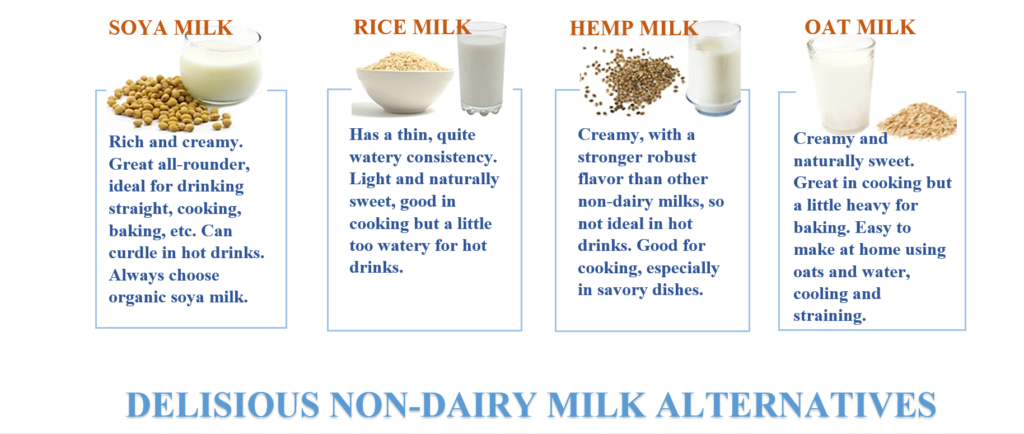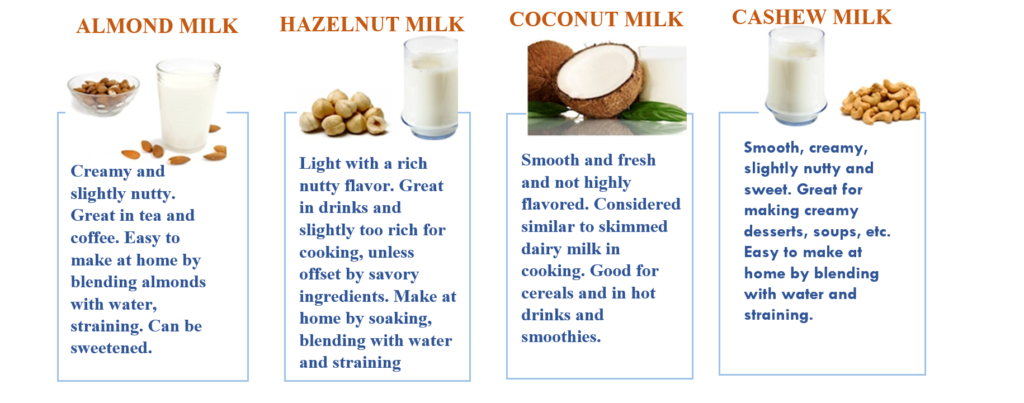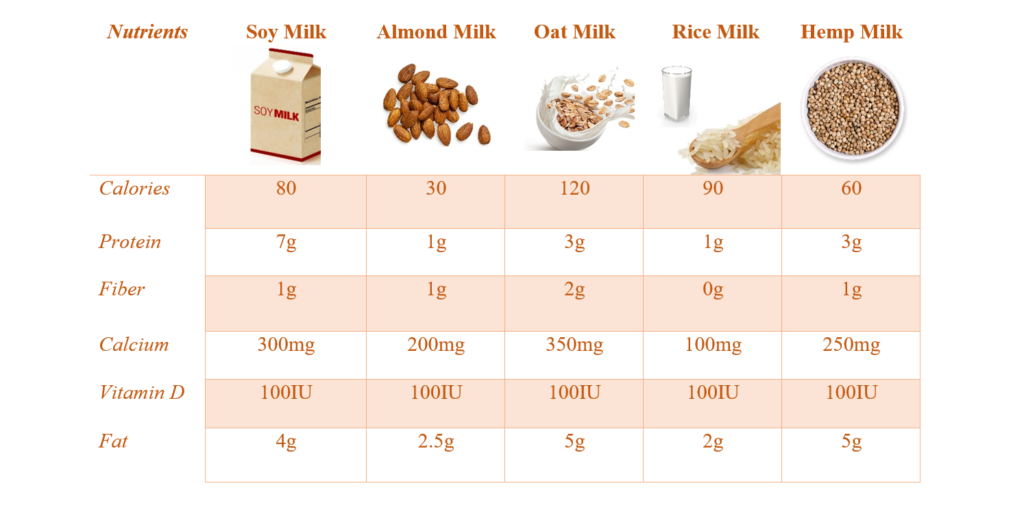Whether you follow a vegan lifestyle, have lactose intolerance, or simply want to explore new flavors, non-dairy milk offers a wide range of options. From soy and almond to coconut and oat, plant-based alternatives have gained immense popularity in recent years. This article delves into the world of non-dairy milk, offering insights into the various types available, their nutritional benefits, and ways to incorporate them into your daily life.
WHAT IS NON-DAIRY MILK?
While traditional dairy milk comes from animal sources, non-dairy milk is produced by blending or processing various plant-based ingredients. These milk alternatives are made from nuts, seeds, grains, and legumes, making them suitable for those following a vegan diet, individuals with lactose intolerance, or anyone looking for a dairy-free option. While cow’s milk has long been a dietary staple, non-dairy milks have gained significant popularity in recent years due to their health benefits and ethical appeal.
EXPLORING THE DIFFERENT TYPES OF NON-DAIRY MILK
- Soy Milk: Soy milk, one of the most common non-dairy alternatives, is derived from soybeans. It offers a smooth, creamy texture and a slightly nutty flavor, making it a versatile choice for both sweet and savory dishes. With a protein content similar to cow’s milk, soy milk is an excellent option for cooking and baking. It provides all essential amino acids, making it a complete protein source. Additionally, soy milk is often fortified with calcium, vitamin D, and iron, making it a nutritious and well-rounded alternative.
- Rice Milk: Produced from milled rice and water, rice milk has a mild, slightly sweet taste and is naturally cholesterol-free and low in fat. It is lactose-free and often enriched with essential vitamins and minerals. For individuals with diverse dietary needs, rice milk is a hypoallergenic and naturally sweet option that can easily replace dairy milk in various recipes. However, it lacks the protein content of other non-dairy options. Rice milk pairs well with cereals, smoothies, and desserts.
- Hemp Milk: Made from ground hemp seeds and water, hemp milk has a creamy texture and a slightly nutty flavor. It stands out for its nutritional profile, being a rich source of omega-3 fatty acids and other essential nutrients.
- Oat Milk: Oat milk, made by soaking oats and blending them with water, has a slightly sweet flavor and a smooth texture. It is gaining popularity as a non-dairy alternative due to its versatility and nutritional benefits. Oat milk is an excellent source of fiber, specifically beta-glucan, which has been shown to lower cholesterol levels. It works well in coffee, cereals, and baking.
- Almond Milk: Almond milk, made by blending ground almonds with water, is one of the most popular plant-based milk alternatives. It has a light, creamy texture and a mild, nutty flavor. Often fortified with vitamins and minerals, almond milk is lower in calories than cow’s milk. It is also a great source of vitamin E, a powerful antioxidant that promotes healthy skin and immune function. However, it may not be suitable for individuals with nut allergies.
- Hazelnut Milk: Hazelnut milk has a rich, nutty flavor and a lighter texture compared to other non-dairy options. It pairs well with drinks and light desserts but is less suitable for cooking or baking. Hazelnut milk can be easily made at home by soaking the nuts overnight, blending with water, and straining the mixture.
- Coconut Milk: Extracted from the white flesh of mature coconuts, coconut milk is rich, creamy, and has a distinct tropical flavor. It is widely used in Asian cuisine and adds a delightful richness to both sweet and savory dishes. Coconut milk is high in healthy fats, providing a feeling of satiety. It also contains lauric acid, known for its antimicrobial properties. Coconut milk enhances the flavor of curries, smoothies, and desserts with its unique richness.
- Cashew Milk: Cashew milk has a smooth, creamy texture with a slightly nutty and sweet flavor. It is an excellent choice for cooking, desserts, and even making homemade cream. Like hazelnut milk, it can be made at home by soaking cashews overnight, blending them with water, and straining the mixture.


NUTRITIONAL BENEFITS OF NON-DAIRY MILK
Non-dairy milk options offer a variety of unique nutritional benefits compared to traditional dairy milk. Below are some key advantages:
- Lower in Calories and Saturated Fat: Non-dairy milk tends to be lower in calories and saturated fat, making it an excellent option for those focused on weight management and cardiovascular health.
- Lactose-Free and Dairy Allergies: For individuals with lactose intolerance, non-dairy milk provides a viable alternative without compromising taste or nutritional value. Many people with lactose intolerance cannot digest lactose, the sugar found in cow’s milk. Non-dairy milk offers a suitable substitute, allowing those with lactose intolerance to enjoy milk-like beverages without discomfort. Additionally, non-dairy milk is a great alternative for individuals with dairy allergies or sensitivities.
- Plant-Based Nutrients: These plant-based alternatives are often fortified with essential vitamins and minerals such as calcium, vitamin D, and vitamin B12, making them a nourishing choice for individuals looking to boost their nutritional intake.
- Potential Allergen Avoidance: Non-dairy milk options allow individuals with allergies or dietary restrictions to enjoy beverages and dishes without compromising their health or taste preferences.
- Healthy Nutrients: Non-dairy milks like almond milk and soy milk provide a good source of healthy fats, protein, and fiber. These nutrients contribute to heart health, support weight management, and enhance overall well-being.
Non-dairy milk is packed with essential nutrients and offers a range of health benefits. Many varieties are fortified with vital nutrients such as calcium, vitamin D, and B vitamins, ensuring that individuals who choose plant-based milk alternatives can still meet their nutritional needs.

Table: “Nutritional Comparison of Popular Non-Dairy Milks”
MAKING THE RIGHT CHOICE: WHAT TO CONSIDER?
When choosing a non-dairy milk alternative, it’s important to consider several factors based on your personal preferences and dietary needs. Here are a few key points to keep in mind:
- Taste and Texture: Experiment with different varieties to find the flavors and textures that best suit your palate and preferences.
- Nutritional Needs: Ensure the non-dairy milk you choose is fortified with essential nutrients, such as calcium, vitamin D, and B vitamins, to help maintain a balanced diet.
- Allergies and Sensitivities: Some individuals may have allergies or sensitivities to certain plant-based ingredients. Be mindful of any potential allergens when selecting a non-dairy milk option.
- Cooking and Baking: Consider how the non-dairy milk will work in cooking and baking. Some varieties, like soy milk and oat milk, are great substitutes in various recipes.
- Sustainability: If environmental impact is important to you, choose non-dairy milk brands that prioritize sustainability and ethical sourcing practices.
INCORPORATING NON-DAIRY MILK INTO YOUR DIET
With the growing availability of non-dairy milk, there are countless ways to incorporate it into your daily routine. Here are a few ideas:
- Enjoy a refreshing glass of non-dairy milk on its own or paired with your favorite cookies for a delightful snack.
- Use non-dairy milk as a base in smoothies or shakes, adding fruits, vegetables, and protein powders for a nutritious boost.
- Substitute non-dairy milk in recipes that typically call for dairy milk, such as pancakes, muffins, or creamy sauces, to enhance both flavor and health benefits.
- Pour a splash of non-dairy milk into your morning coffee or tea to add a subtle sweetness and smoothness to your beverage.
- Experiment with different non-dairy milk varieties in your favorite recipes to explore new taste profiles and textures.
ENVIRONMENTAL AND ETHICAL CONSIDERATIONS
Choosing non-dairy milk over traditional dairy milk can have a positive impact on both the environment and animal welfare. Animal agriculture is a significant contributor to greenhouse gas emissions and deforestation, while non-dairy milk production generally requires fewer resources and produces fewer carbon emissions. Additionally, opting for non-dairy milk aligns with ethical considerations for individuals concerned about animal welfare. By switching to plant-based milk alternatives, we can reduce the demand for animal products and promote a more sustainable food system.
“Embrace the diversity of non-dairy milk and embark on a journey of new flavors, textures, and health benefits.” Non-dairy milk is no longer just a niche market; it has become a mainstream staple for individuals seeking alternatives to traditional dairy products. With a wide array of options available, from soy to almond, coconut to oat, there is a non-dairy milk for every taste and dietary need. Embrace the variety, explore new recipes, and enjoy the numerous benefits of these delicious and nutritious alternatives.
REFERENCE:
- [The Benefits and Drawbacks of Popular Non-Dairy Milks](https://www.medicalnewstoday.com/articles/the-benefits-and-drawbacks-of-popular-nondairy-milks)
- [Nutrition Facts and Health Effects of Almond Milk](https://www.healthline.com/nutrition/nutrition-facts-almond-milk)
- [The Health Benefits of Coconut Milk](https://www.webmd.com/food-recipes/health-benefits-coconut-milk)
- [Oat Milk: Nutrition, Benefits, and How to Make Your Own](https://www.healthline.com/nutrition/oat-milk)
- [Is Rice Milk a Healthy Non-Dairy Alternative?](https://www.verywellfit.com/what-you-should-know-about-rice-milk-4165171)
- “Non-dairy milk offers a lactose-free option for those with lactose intolerance or dairy allergies, allowing them to enjoy milk alternatives without discomfort.” – [Source](https://www.ncbi.nlm.nih.gov/pmc/articles/PMC3583280/)
- “Non-dairy milk options like almond milk and soy milk provide a good source of healthy fats, protein, and fiber, which can support heart health and weight management.” – [Source](https://www.ncbi.nlm.nih.gov/pmc/articles/PMC6024687/)
- “Choosing non-dairy milk over traditional dairy milk can have a positive impact on the environment by reducing greenhouse gas emissions and deforestation associated with animal agriculture.” – [Source](https://www.ewg.org/)
- “The abundance of flavors, health benefits, and sustainability make non-dairy milk a delicious and ethical choice for those seeking an alternative to traditional dairy milk.” – [Source](https://www.ncbi.nlm.nih.gov/pmc/articles/PMC3583280/)
- https://www.verywellfit.com/rice-milk-nutrition-facts-and-health-benefits-5079660



